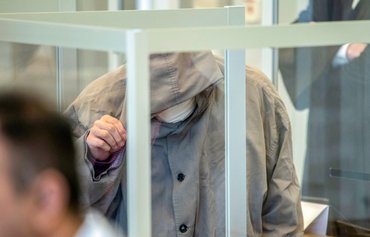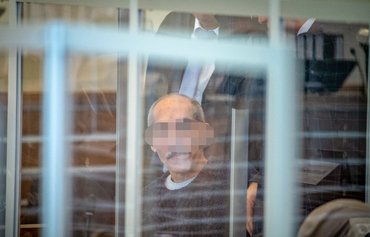BERLIN -- A Syrian national has been arrested in Germany in connection with charges of crimes against humanity and war crimes. He allegedly took part in a brutal crackdown on regime opponents, prosecutors said Thursday (August 3).
The suspect, identified only as Ahmad H. in line with German legal practice, was detained July 26 in Bremen, the federal prosecutor's office said in a statement.
He was remanded in custody on Thursday.
Ahmad H. is accused of acting between 2012 and 2015 during Syria's war as a local leader of pro-regime "shabiha" militiamen in Damascus tasked with helping to crush dissent.
![Syrian opposition fighters detain a man they allege is a member of the 'shabiha', or pro-regime militia, in Aleppo on August 12, 2012. [Achilleas Zavallis/AFP]](/cnmi_am/images/2023/08/04/43355-syria-shabiha-arrest-600_384.jpg)
Syrian opposition fighters detain a man they allege is a member of the 'shabiha', or pro-regime militia, in Aleppo on August 12, 2012. [Achilleas Zavallis/AFP]
The militia operated checkpoints where "people were arrested arbitrarily so that they or their family members could be extorted for money, committed to forced labor or tortured", prosecutors said.
The fighters also plundered the homes of opponents of the Syrian regime of Bashar al-Assad, sold the spoils and kept the profits, they added.
Ahmad H., who security sources said is 46, is accused of taking part "personally in the abuse of civilians". They say that in one incident in 2013, he ordered militiamen to "brutally torment a detained man for hours using plastic pipes".
In autumn 2014, Ahmad H. and other militiamen and members of the military secret service allegedly attacked a civilian at a checkpoint, grabbing him by the hair and beating his head on the pavement.
Between December 2012 and early 2015, he is accused of twice arresting groups of 25 to 30 people and forcing them to carry sandbags to the nearby front.
They faced crossfire and were deprived of food and water while being beaten.
Video evidence
The Syrian Justice and Accountability Center, which tracks cases of human rights abuses in Syria, said the arrest came after its investigation "uncovered potentially incriminating evidence", including video evidence.
It launched its probe after a witness told the agency in May 2020 that the suspect -- nicknamed "The Trix (Bulldozer)" -- was living in Germany.
He had been active in the southern Damascus suburb of Tadamon, and was suspected of being one of the most dangerous criminals from the pro-regime National Defense Forces militia, the center said.
Video footage of an April 2013 massacre of Syrian civilians in Tadamon by members of the al-Mantaqa branch (Branch 227) of the Syrian regime's intelligence apparatus came to light several years ago.
The footage shows militiamen forcing blindfolded civilians in Tadamon to run towards a pit, in some cases jeering at them.
The runners -- who clearly do not understand what is happening to them -- are fatally shot as they reach the pit, their bodies toppling onto other corpses.
Universal jurisdiction
Germany and other countries, including France and Sweden, have used the principle of universal jurisdiction to prosecute certain crimes regardless of where they took place, to try Syrians for atrocities committed during Syria's war.
Germany used the principle to sentence a former Syrian colonel to life in jail in January 2022 for overseeing the murder, in 2011 and 2012, of 27 people at Al-Khatib detention center in Damascus, aka "Branch 251".
In the first court case worldwide over state-sponsored torture by the Syrian regime, a German court in February 2021 convicted a former Syrian intelligence service agent for complicity in crimes against humanity.
Eyad al-Gharib, 44, a former low-ranking member of the intelligence service, was convicted for his role in helping to arrest at least 30 protesters after a rally in Duma and to deliver them to Al-Khatib.
During the trial, more than a dozen Syrian men and women took the stand to testify about the abuses they endured in Al-Khatib.
The trial also marked the first time that photos from the so-called Caesar files were presented in court.
'Committed to accountability'
The 50,000 images taken by Syrian military police defector "Caesar" show the corpses of 6,786 Syrians who had been starved or tortured to death inside the Syrian regime's detention centers.
These included photographs that show the mutilated bodies of prisoners with numbers marked on their foreheads.
European Union foreign ministers in March 2021 said they would demand "accountability" from the Syrian regime as well as extremist and other armed groups over alleged war crimes committed since the conflict began.
"Our countries are committed to ensuring that war criminals and torturers will not go unpunished," the 18 ministers said in a joint statement published on the website of the French Foreign Ministry.
"We will not remain silent in the face of the atrocities that have taken place in Syria, for which the regime and its external supporters bear the main responsibility," the ministers said.

![An obituary announcement for Syrian 'martyrs' killed in confrontations with 'criminal gangs and al-Assad shabiha militiamen' is hung on a wall in Duma, a northeastern suburb of Damascus, on August 29, 2011. [Joseph Eid/AFP]](/cnmi_am/images/2023/08/04/43356-syrian-martyrs-duma-600_384.jpg)






